Films with theme "Dans la Grèce mythologique", sorted by revenue

Ursus (1961)
, 1h34Directed by Romolo Guerrieri, Carlo Campogalliani
Origin Espagne
Genres Action, Adventure, Peplum
Themes Films based on mythology, Films based on Greco-Roman mythology, Dans la Grèce mythologique, Films based on Greco-Roman mythology
Actors Cristina Gaioni, Moira Orfei, Luis Prendes, Mario Scaccia, Mariangela Giordano, Roberto Camardiel
Le colosse Ursus, de retour chez lui après avoir livré bataille, découvre que sa fiancée Attea a été déportée sur une île lointaine par des prêtres païens. Il part à sa recherche avec Doreide, une esclave aveugle qui devine qu'Attea a été enlevée par Setas, un ancien ami d'Ursus. Ce dernier se met en travers de leur chemin et capture Ursus qui arrive à briser ses liens et réussit à s'enfuir avec Doreide. Ils rencontrent la belle courtisane Magali qui se propose de les aider à traverser une zone désertique. Magali essaie de séduire Ursus et, ulcérée par son refus, tente de le piéger avec la complicité de Setas, mais elle meurt dans leur affrontement dont Ursus et Doreide sortent victorieux. Le couple arrive enfin dans l'île et découvre qu'Attea, soumise à l'emprise maléfique de Setas, est devenue la malfaisante prêtresse de l'île. Ursus essaie sans succès de la soustraire au pouvoir occulte de Setas et se retrouve dans une arène pour combattre un monstrueux taureau qu'il finit par tuer. Ursus dresse alors une révolte au cours de laquelle Attea et Setas trouvent la mort tandis que Doreide recouvre la vue à la suite d'une violente commotion. Elle s'embarque avec Ursus sur le chemin du retour.
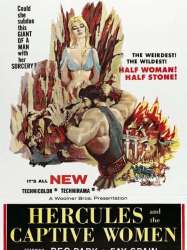 , 1h38
, 1h38Directed by Vittorio Cottafavi
Origin Italie
Genres Fantasy, Action, Adventure, Peplum
Themes Films about magic and magicians, Seafaring films, Films about music and musicians, Films based on mythology, Transport films, Musical films, Films based on Greco-Roman mythology, Dans la Grèce mythologique, Films set in Atlantis, Films based on Greco-Roman mythology
Actors Fay Spain, Ettore Manni, Enrico Maria Salerno, Gian Maria Volonté, Laura Efrikian, Ivo Garrani
When strange atmospheric events occur in the disunited city states of Ancient Greece, a forum debates what action to take. As there is no agreement, Androcles King of Thebes seeks the assistance of his friend, the legendary Hercules. Hercules, now married to Deianira with a son named Hylas does not wish to leave the comfort of his family, though Hylas is keen for adventure.
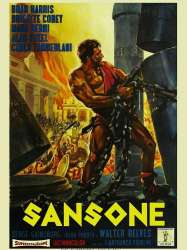
Samson (1961)
, 1h40Directed by Gianfranco Parolini
Origin France
Genres Fantasy, Adventure, Peplum
Themes Films based on mythology, Films based on Greco-Roman mythology, Dans la Grèce mythologique, Films based on Greco-Roman mythology
Actors Bradford Harris, Serge Gainsbourg, Alan Steel, Luisella Boni, Mara Berni, Carlo Tamberlani
The treacherous court counselor Warkalla takes possession of the throne of Sulan and of the goods of Queen Mila, replacing her with the beautiful but insignificant Romilda. Samson joins Mila and the rebels to regain the kingdom of Sulan and to hunt Romilda and Warkalla.
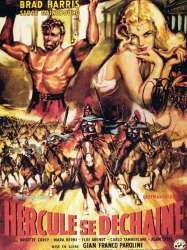
The Fury of Hercules (1962)
, 1h37Directed by Gianfranco Parolini
Origin Italie
Genres Fantasy, Adventure, Peplum
Themes Films based on mythology, Films based on Greco-Roman mythology, Dans la Grèce mythologique, Films based on Greco-Roman mythology
Actors Bradford Harris, Serge Gainsbourg, Luisella Boni, Mara Berni, Carlo Tamberlani, Alan Steel
Hercules is reached by the slave Daria, who informes him that his country has fallen into the hands of the tyrant Meniste. Hercules follows Daria in his homeland, where he discovers that Meniste enslaves the citizens of the city, and that a group of rebels are trying an insurrection. Meniste fears the power of Hercules, however he kills Daria. So Hercules puts himself in charge of the band of rebels, and destroys the power of Meniste.

Electra (1962)
, 2hDirected by Michael Cacoyannis
Origin Grece
Genres Drama, Action, Historical
Themes Films based on mythology, Théâtre, Films based on Greco-Roman mythology, Films based on plays, Dans la Grèce mythologique, Films based on Greco-Roman mythology
Actors Irène Papas, Manos Katrakis, Kóstas Kazákos
When the King Agamemnon is murdered by his wife Clytemnestra and her lover and relative Aegisthus, the daughter Electra decides to get even, with the help of her brother Orestes. He helps his cousin Pylades to steal into Clytemnestra's house, and despite the fact that she is his mother, stabs her to death, then Aegisthus, as well.

My Son, the Hero (1962)
, 1h55Directed by Duccio Tessari
Origin Italie
Genres Fantastic, Fantasy, Action, Adventure, Peplum
Themes Seafaring films, Films based on mythology, Transport films, Films based on Greco-Roman mythology, Dans la Grèce mythologique, Films based on Greco-Roman mythology
Actors Giuliano Gemma, Jacqueline Sassard, Pedro Armendáriz, Antonella Lualdi, Fernando Rey, Gérard Séty
The king of Crete, Cadmos, has just murdered his wife in order to live with his scheming lover Ermione. For this deed, a prophetess curses him in the name of the gods, foretelling him that the man his infant daughter Antiope would one day fall in love with will eventually be his doom. Furious at the gods' judgement and unable to kill Antiope on the spot (lest the curse would fulfill itself immediately), megalomanic Cadmos renounces the gods and proclaims himself one. To this end, he and Ermione undergo a treatment with mystical vapors which render their bodies invulnerable (save for one critical spot on Ermione's chest uncautiously left covered).

The Conqueror of Atlantis (1965)
Directed by Alfonso Brescia
Origin Italie
Genres Fantasy, Action, Adventure, Peplum
Themes Seafaring films, Films based on mythology, Transport films, Films based on Greco-Roman mythology, Dans la Grèce mythologique, Films set in Atlantis, Films based on Greco-Roman mythology
Actors Hélène Chanel, Piero Lulli
After a ship wreckage Hercules finds himself on an unknown coast. He is found by princess Virna which takes care of the wounded Hercules. After a nightly assault Virna disappeared. Hercules starts to search her and finally finds her in Atlantis where Virna had been selected to become the new heires after the current Queen Ming. Hercules gets captured by Ming's amazon guard.

Oedipus Rex (1967)
, 1h44Directed by Pier Paolo Pasolini
Origin Italie
Genres Drama
Themes Films based on mythology, Films about sexuality, Théâtre, Films based on Greco-Roman mythology, Films based on plays, Dans la Grèce mythologique, Films based on Greco-Roman mythology
Actors Silvana Mangano, Franco Citti, Alida Valli, Carmelo Bene, Julian Beck, Ninetto Davoli
A son is born to a young couple in pre-war Italy. The father, motivated by jealousy, takes the baby into the desert to be abandoned, at which point the film’s setting changes to the ancient world. The child is rescued, named Edipo by King Polybus (Ahmed Belhachmi) and Queen Merope (Alida Valli) of Corinth and raised as their own son. When Edipo (Franco Citti) learns of a prophecy foretelling that he will kill his father and marry his mother, he leaves Corinth believing that Polybus and Merope are his true parents.

The Trojan Women (1971)
, 1h45Directed by Michael Cacoyannis
Origin United-kingdom
Genres Drama
Themes Films based on mythology, Théâtre, Films based on Greco-Roman mythology, Political films, Films based on plays, Dans la Grèce mythologique, Films based on Greco-Roman mythology
Actors Katharine Hepburn, Vanessa Redgrave, Geneviève Bujold, Irène Papas, Brian Blessed, Patrick Magee
The Trojan Women was one of a trilogy of plays dealing with the suffering created by the Trojan Wars. Hecuba (Katharine Hepburn), Queen of the Trojans and mother of Hector, one of Troy's most fearsome warriors, looks upon the remains of her kingdom; Andromache (Vanessa Redgrave), widow of the slain Hector and mother of his son Astyanax, must raise her son in the war's aftermath; Cassandra (Geneviève Bujold), Hecuba's daughter who has been driven insane by the ravages of war, waits to see if King Agamemnon will drive her into concubinage; Helen of Troy (Irene Papas), waits to see if she will live. But the most awful truth is unknown to them until Talthybius (Brian Blessed), the messenger of the Greek king, comes to the ruined city and tells them that King Agamemnon and his brother Menelaus have decreed that Hector's son Astyanax must die — the last of the male royalty of Troy must be executed to ensure the extinction of the line.

Iphigenia (1977)
, 2h7Directed by Michael Cacoyannis
Origin Grece
Genres Drama, Action
Themes Films based on mythology, Théâtre, Films based on Greco-Roman mythology, Political films, Films based on plays, Dans la Grèce mythologique, Films based on Greco-Roman mythology
Actors Irène Papas, Tatiána Papamóschou, Kóstas Kazákos, Panos Mihalopoulos
Approximately 2,500 years ago, the Athenian tragedians -- Sophocles, Aeschylus, Euripides -- said it all in the most eloquent and poetic terms. Everyone else has followed in their footsteps, from Goethe and Shakespeare to Mann and Beckett. More than ever, the ancient tragedies are relevant today, for their subject matter is the universal nature of man: his hunger for domination, his greed and his lust. The plays are the confirmation of the human tragedy for all times and all places. The Greek myths upon which these tragedies are based combine marvelous storytelling with symbolic associations that are the foundations of the collective unconscious of our modern world.
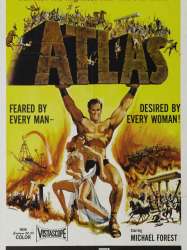
Atlas (1961)
, 1h19Directed by Roger Corman
Origin USA
Genres Science fiction, War, Fantasy, Action, Adventure, Peplum
Themes Films based on mythology, Films based on Greco-Roman mythology, Dans la Grèce mythologique, Films based on Greco-Roman mythology
Actors Michael Forest, Frank Wolff, Roger Corman, Dick Miller, Charles B. Griffith, Walter Maslow
The hero Atlas fights against the evil king Proximates.
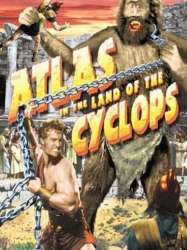
Atlas Against the Cyclops (1961)
, 1h40Directed by Antonio Leonviola
Origin Italie
Genres Fantasy, Adventure, Peplum
Themes Films about magic and magicians, Films based on mythology, Films based on Greco-Roman mythology, Dans la Grèce mythologique, Films based on Greco-Roman mythology
Actors Gordon Mitchell, Vira Silenti, Aldo Bufi Landi, Raffaella Carrà, Fabio Lanzoni, Tullio Altamura
Queen Capys is doomed to a life of slavery by the Powers of Darkness until the last descendant of Ulysses is put to death to please the Cyclops. This is almost accomplished in a raid on a village by the Queen's soldiers where a descendant of Ulysses is killed and his wife enslaved; however, their infant son is taken away to be protected by Maciste.
 , 1h45
, 1h45Directed by Kurt Hoffmann
Origin German
Genres Comedy, Musical
Themes Films based on mythology, Théâtre, Musical films, Films based on Greco-Roman mythology, Films based on plays, Dans la Grèce mythologique, Films based on Greco-Roman mythology, Molière au cinéma
Actors Willy Fritsch, Fita Benkhoff, Paul Kemp, Hilde Hildebrand, Aribert Wäscher, Ewald Wenck
Amphitryon is a Theban general away at war. The god Jupiter disguises himself as Amphitryon to seduce Amphitryon's wife, Alkmene.
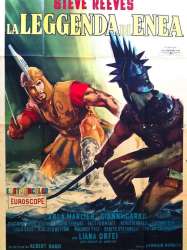
The Avenger (1962)
, 1h35Directed by Giorgio Venturini
Origin France
Genres Drama, War, Adventure, Historical
Themes Films based on mythology, Poésie, Films based on Greco-Roman mythology, Adaptation d'un poème, Dans la Grèce mythologique, Films based on Greco-Roman mythology
Actors Steve Reeves, Carla Marlier, Liana Orfei, Giacomo Rossi Stuart, Gianni Garko, Mario Ferrari
Aeneas leads escaped survivors of the Trojan war to new land in Italy. Based on Virgil's The Aeneid.
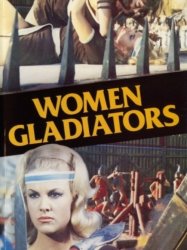
Thor and the Amazon Women (1963)
, 1h35Directed by Antonio Leonviola, Tonino Ricci
Origin Italie
Genres Fantasy, Action, Adventure, Peplum
Themes Films based on mythology, Films based on Greco-Roman mythology, Films based on Norse mythology, Dans la Grèce mythologique, Films based on Greco-Roman mythology
Actors Joe Robinson, Harry Baird, Maria Fiore
Thor and the Amazon Women (original title: Le Gladiatrici) is a sword and sandal picture that features a civilization of women warriors ruled by the evil Black Queen who has subjugated the men in her land. Thor and his friend Ubaratutu live in a distant village with a young blonde woman named Tamar and her young brother Homolke. Tamar’s father was the king of a seaside village who had been killed several years earlier when the Black Queen’s Amazon warriors raided the village.
 Connection
Connection